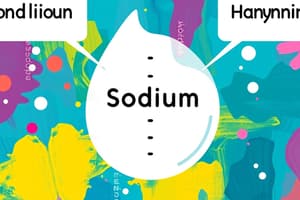Podcast
Questions and Answers
Which food category had the highest percentage contribution to sodium intake in Canadians in 2017?
Which food category had the highest percentage contribution to sodium intake in Canadians in 2017?
- Cheese
- Processed Meat Products (correct)
- Mixed Dishes
- Bakery Products
Hypernatremia refers to an abnormally high level of sodium in the blood.
Hypernatremia refers to an abnormally high level of sodium in the blood.
True (A)
What management strategy can be used to address hyponatremia?
What management strategy can be used to address hyponatremia?
Fluid restriction or sodium supplementation
The food category that typically contains high levels of sodium is __________.
The food category that typically contains high levels of sodium is __________.
Match the following conditions with their common causes:
Match the following conditions with their common causes:
What is the most likely electrolyte abnormality if a neighbor appears disoriented and sweats profusely?
What is the most likely electrolyte abnormality if a neighbor appears disoriented and sweats profusely?
Normal saline (0.9% NaCl) is the first line treatment for a hemodynamically stable patient with hypovolemic hypernatremia.
Normal saline (0.9% NaCl) is the first line treatment for a hemodynamically stable patient with hypovolemic hypernatremia.
What is the recommended method for managing central diabetes insipidus?
What is the recommended method for managing central diabetes insipidus?
In cases of sodium overload, the administration of ______ and a loop diuretic is necessary.
In cases of sodium overload, the administration of ______ and a loop diuretic is necessary.
Which condition should be managed with thiazide diuretics?
Which condition should be managed with thiazide diuretics?
Chloride is a major intracellular cation and normally follows potassium in the body.
Chloride is a major intracellular cation and normally follows potassium in the body.
How often should sodium concentration be measured when managing sodium overload?
How often should sodium concentration be measured when managing sodium overload?
Match the management strategies with their corresponding conditions.
Match the management strategies with their corresponding conditions.
What is the condition associated with low sodium levels in the blood?
What is the condition associated with low sodium levels in the blood?
Hypernatremia is a condition characterized by high levels of sodium in the blood.
Hypernatremia is a condition characterized by high levels of sodium in the blood.
What is the daily adequate intake of sodium for normal health?
What is the daily adequate intake of sodium for normal health?
Hyponatremia can lead to symptoms such as confusion, ____ and seizures.
Hyponatremia can lead to symptoms such as confusion, ____ and seizures.
Match the sodium imbalance with its associated characteristics:
Match the sodium imbalance with its associated characteristics:
Which age group in Canada reportedly consumes the highest percentage of excessive sodium?
Which age group in Canada reportedly consumes the highest percentage of excessive sodium?
Management strategies for sodium abnormalities do not involve dietary adjustments.
Management strategies for sodium abnormalities do not involve dietary adjustments.
What is one possible symptom of hypernatremia?
What is one possible symptom of hypernatremia?
The total body water (TBW) in a person represents _____% of their total body weight.
The total body water (TBW) in a person represents _____% of their total body weight.
Which management strategy is NOT typically used for managing electrolyte abnormalities?
Which management strategy is NOT typically used for managing electrolyte abnormalities?
Flashcards are hidden until you start studying
Study Notes
Sodium Imbalances
- Sodium imbalances are important areas of focus
- Sodium imbalances include Hyponatremia (low sodium) and Hypernatremia (high sodium)
Sodium Homeostasis
- Daily sodium intake recommendations are between 1000-1500 mg
- This is approximately half a teaspoon of table salt
Sodium Intake
- Canadians consume a high amount of sodium, with a significant portion consuming an excess.
- Major food contributors to sodium intake in Canadians (% contribution) are: Bakery Products, Mixed Dishes, Processed Meat Products, Cheese, Soups, Sauces & Condiments, Fat, Oils, Spreads, and Dressings, Snacks, Fish & Seafood Products, Breakfast Cereals, Processed Vegetables & Vegetable juice, and Nut Butters.
Studying That Suits You
Use AI to generate personalized quizzes and flashcards to suit your learning preferences.




